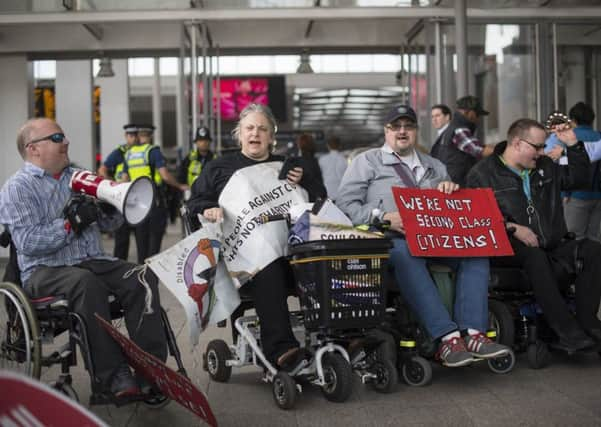More than 40 per cent of train stations '˜cannot be used by some disabled passengers'


Over 40% of the country’s 2,560 stations do not have full step-free access, according to analysis of Office of Rail and Road data by charity Leonard Cheshire.
It claims this is “barring disabled people from travelling independently”.
Advertisement
Hide AdAdvertisement
Hide AdThe charity warned that many disabled people face difficulties planning journeys due to unclear information about station accessibility.
Passengers have also reported problems arranging ramps to get them between a platform and a train.
Leonard Cheshire is calling for the Government and train operators to make all stations fit for use by disabled people.
The charity’s chief executive Neil Heslop said: “Poor public transport is forcing disabled people to miss out on everyday events which others take for granted, from employment opportunities to social events.
Advertisement
Hide AdAdvertisement
Hide Ad“Disabled people cannot continue to put their lives on hold. Rail operators must make it their absolute priority to ensure that their train stations have step-free access, so that all their customers can travel as they choose.”
RMT union leader Mick Cash described the figures as “shameful”.
Robert Nisbet, regional director at industry body the Rail Delivery Group, said: “Over seven in 10 journeys are from step-free stations but we want everyone to be able to benefit from the opportunities travelling by train opens up, including disabled people.
“As part of our plan to change and improve, we’re working together with disability groups improve accessibility and investing in projects that will improve our service, including rolling out a new assistance app and installing more lifts and ramps at stations.”
Advertisement
Hide AdAdvertisement
Hide AdA Department for Transport spokesman said: “We are determined to make sure that our railways are accessible to everyone, which is why we have already invested to deliver accessible routes and step free access at nearly 2,000 stations around the country.
“But we recognise there is more to be done, which is why we launched our Inclusive Transport Strategy earlier this year and are committing further funding to deliver enhancements at railway stations until at least 2024.”
Previous research by Leonard Cheshire suggested more than a third (35%) of working age disabled people had experienced problems using trains in the past year as a result of their disability.
In July disabled comedian Tanyalee Davis made headlines when she was forced to move her mobility scooter from a disabled space on a Great Western Railway train.
Advertisement
Hide AdAdvertisement
Hide AdShe was reduced to tears when a train guard made her move so a woman could put her pram in the wheelchair area.
In March a disabled doctor was left stranded on a train in her wheelchair when no staff arrived to help her get off at London Euston, despite her booking assistance.
Dr Hannah Barham-Brown said it was one of a number of incidents she has suffered, adding that they make her feel “worthless”.
A smartphone app to ease travel for disabled passengers is to be rolled out across Britain in autumn 2019.
Advertisement
Hide AdAdvertisement
Hide AdThe passenger assistance app will make it easier for people with a disability to book and amend assistance requirements for train journeys.
Many customers currently use a time-consuming phone or online process which results in railway staff using printed lists of bookings, which are not updated when connections are missed due to delays and cancellations.